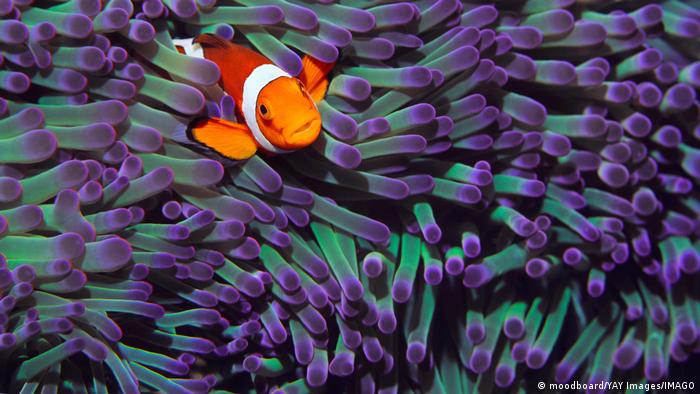ENVIRONMENT
Noise pollution: Why the sea needs more peace
Too much noise is not only annoying for us on land but also to animals underwater. Worse, too much noise can kill them. Three solutions for making the oceans quieter and why less noise is good for the climate.
A Clownfisch swimming among anenomies
Over the last 50 years, noise along major shipping routes is estimated to have increased 32-fold
What may look like a calm and still ocean from shore is anything but. From the magical song of whales to the clicking of dolphins and chattering of crustaceans, the sea hosts a symphony of sounds.
Here animals use sound to communicate, navigate, find mates or prey. Sound is essential for the survival of almost all sea creatures.
Clownfish, which you might now from the animation film “Finding Nemo,” set in Australia’s Great Barrier Reef, make it clear who is boss by clacking with their jaws. Small shrimp advertise their services to reef fish by flapping their fins.
And some coral fish listen carefully when choosing the right reef. The ocean sounds inform them if the reef is healthy enough to provide for their offspring.
Disturbing the peace
But in reality, oceans are being infiltrated by alien sounds that have intruded an ancient underwater symphony. Global waters are noisier today than ever before.
It’s disastrous for a wide range of marine life. Some sea creatures are being exposed to noise levels that could deafen or even kill them.
Clownfish underwater
Who’s the boss? Clownfish decide that by clacking with their jaws
“It’s like walking around in a fog,” Lindy Weilgart, a marine biologist for the nongovernmental organization Ocean Care and Dalhousie University in Canada, told DW. For underwater life, undue noise affects “foraging, protection from predators, awareness of surroundings, reproduction,” Weilgart explained.
But it doesn’t have to be that way. Ocean noise can be reduced in numerous ways.
More efficient ships are better for the climate and noise levels
Ship noise is generated primarily by the ship’s propeller — an effect called cavitation.
Container ships that are used to conduct 90% of global trade are the main source of this noise pollution. Over the last 50 years, noise along major shipping routes is estimated to have increased 32-fold.
A container ship arriving in a harbor
Thousands of vessels are cruising the oceans right now
In response, more efficient container ship propellers can make the sea quieter while also saving polluting fuel.
Max Schuster, who advises shipping companies on how to reduce underwater acoustic noise at the consulting firm DW-ShipConsult, explains how rapid propeller movement is to blame for all the racket.
As the propeller churns through the water the “pressure is extremely low in some places,” which causes the water to boil and form “vapor bubbles that grow, shrink and collapse,” he said.
The noise level caused by collapsing bubbles during ship propeller cavitation is comparable to that of a rock concert. Less cavitation would not only mean less noise but less fuel consumption — and cost — which would also be a win for the climate and balance sheets.
Play Video8:03 min
Ocean noise pollution – A quieter future?
In 2017, the Danish company Maersk retrofitted the engines and propellers on five of its cargo ships to save fuel. However, noise levels also dropped by 75%. Retrofits are not cheap, however, and shipping companies are rarely required to do them.
Incentives for shipping operators have, however, been provided by the Port of Vancouver. Ships that are proven to be quieter pay only half the port fees.
Using air bubbles to combat noise
As a rule, the less man intervenes in the marine ecosystem, the less disturbing the noise.
However, if noise does occur, such as during the installation of wind turbines, so-called bubble curtains can help.
Offshore wind energy is an important part of the energy transition to limit climate change. To meet our climate targets, we need to install 150,000 new offshore wind turbines worldwide by 2050.
Offshore parks in the Ferman North Sea
Offshore windparks generate a huge amount of noise – how can we mitigate noise pollution?
“This generates noise underwater that is more or less comparable to an airplane taking off on land,” said Michael Bellmann of the Institute of Technical and Applied Physics (ITAP).
Bubble curtains, whereby compressed air flows through tubes on the seafloor, can help reduce this noise. When installed, the tubes sit around the turbine pylons and allow air bubbles to rise to the surface and form an insulating veil. Fewer sound waves can pass through this curtain of bubbles, with noise reduced by up to 90%.
Normally, construction site noise can be heard miles away underwater. In the North Sea, it was sometimes so loud that porpoises suffered hearing damage and were scared away from their feeding and breeding grounds.
However, due to stricter regulations, the curtains are now almost standard for offshore installations in the German North Sea. And interest is also growing in the US, the Netherlands and Taiwan. Environmental protection is very affordable in this instance. The cost of using bubble curtains during the turbine construction phase amounts to just 1% of the total investment for an offshore wind farm.
Ending oil and gas exploration would make the sea quieter
If the search for new sources of oil and gas were to be stopped, we would not only come much closer to the goal of limiting global warming to 1.5 degrees Celsius. The seas would also suddenly become much quieter.
So-called “seismic airguns” are used in the search for oil and gas in the seabed, the reflected sound waves providing information about the geological profile. Air guns are towed behind ships and fire compressed air every 10 seconds for days, weeks or months. This produces noise as loud as the launch of a rocket.
Seismic blasting underwater
Seismic blasting is dangerous for marine wildlife
With each explosion, a large proportion of the larvae of the smallest marine animals die immediately within a radius of 1 kilometer (0.6 miles).
Airguns are far too loud for their intended use, says Lindy Weilgart. But instead of stopping fossil fuel exploration and production, the oil and gas industry is working on quieter exploration technologies.
One technique, so-called “marine vibroseis,” uses a device to generate sound waves using vibration rather than an explosion. It creates a kind of constant hum instead of a big bang.
“An airgun is so powerful, it could rip your arm off. Whereas on land, you could put an egg under a vibroseis device and it wouldn’t break,” Weilgart continued.
With the new method, it is estimated that only 10% of marine life would be affected in any way compared. But investors, including ExxonMobil, TotalEnergies or Shell, may be targeting another advantage. Marine vibroseis, unlike airguns, can also detect oil and gas in shallow waters.
Weigart says the attempt to create sustainable methods of fossil fuel exploration are absurd. Instead of searching for new oil and gas deposits, it would be better to promote the energy revolution, says the marine biologist.
This article was originally published in German.
DW RECOMMENDS
Three workable solutions to environmental problems
Shifting seasons, burning forests and cities so loud they’re making us sick and harming birds. We look at three environmental problems and how they can be solved.
Coronavirus lockdown gives animals rare break from noise pollution
The COVID-19 lockdown could become an unprecedented natural experiment in noise pollution. Some of the world’s most vocal animals — birds and whales — might already be benefiting from a quieter environment.
Noise pollution threatens health of one in five Europeans
One in every five Europeans is suffering from noise pollution so bad that it could harm their health, according to a new study. Road traffic was cited as the main cause, with the problem expected to grow worse.
AUDIOS AND VIDEOS ON THE TOPIC
Suffering from sound: Wildlife and noise
Date 26.09.2022
Author Tim Schauenberg
Related Subjects Oceans, Fish
Keywords noise pollution, oceans, fish, coral reefs, whales, clownfish
Feedback: Send us your feedback.
Print Print this page
Permalink https://p.dw.com/p/4HGIf

























